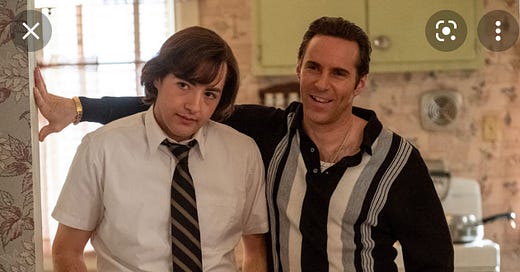HBO: “The Many Saints of Newark”—the prequel to “The Sopranos”
Popular opinion of HBO’s “The Sopranos” is all over the map. Some people have never seen it. Others won’t watch it because they disapprove of its portrayal of Italian-Americans.
And then are those (including this Italian-American) who think it’s one of the best things to ever appear on television.
No matter what your opinion of the show is, i think that somewhere in some far-off universe, critics and viewers alike may agree that “The Many Saints of Newark,” the prequel to “The Sopranos” (TS) which portrays Tony as a young man and is currently running in theaters and on HBO is an atrocity.
The full-length tale, set in 1960s-1970s Newark, NJ and its environs, stars the usually debonair Alessandro Nivola as Dickie Molisanti, the father of Christopher in TS. Dickie (as played by Nivola, obviously channeling the young Robert DeNiro) is the kind of bully who used to beat you up in middle school before stealing your Jell-O. Whereas the original series had the bandwidth to develop Tony and the many facets of his complex character, Dickie is 100 percent thug from the get-go.
Nevertheless, young Tony (played by Michael Gandolfini who is the late James Gandolfini’s son) idolizes Dickie, although it isn’t clear why. The kindest thing that can be said about MG’s performance is that he is still young and that there is time to consider another career. Because acting ain’t it, dude.
Some of the individual performances are great. Leslie Odom Jr. (“Hamilton”) is terrific as the black mobster who forms a rival gang to get in on the loot that the Mafiosi have been keeping for themselves. Vera Farmiga (“Up in the Air”) is wonderful as young Tony’s grouchy Italian mother. I also liked Corey Stoll (you may remember him as Ernest Hemingway in “Midnight in Paris”) as the young Uncle Junior. Perhaps best of all, Ray Liotta is superb as Dickie’s uncle who has been incarcerated for decades and gives off sort of a Buddhist-like chill whenever Dickie comes to visit him in jail.
Also in its favor: some highly graphic, very authentic-looking scenes portraying the 1967 Newark race riots. Unfortunately, the rest of the movie—violent, sour, and faux-Italian—makes it nothing more than a D-minus gangster flick.
The best thing about the movie is the end, when the credits roll over the original TS theme music. It brings back memories of a great period in television history, and helps wash away the nightmare of a masterpiece gone bad.
As we Italians
say, fuhgeddaboutit.



